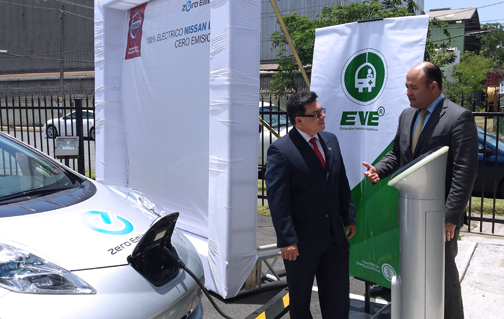PREPA, Nissan pave way for arrival of electric cars


PREPA Executive Director Juan Alicea and a Nissan executive offer details of the strategy to introduce electric cars to the island this year.
A major hurdle to marketing electric vehicles in Puerto Rico has been the absence of a network of charging stations, but a cooperative agreement between the Puerto Rico Electric Power Authority and Nissan Motor Co. signed Wednesday now paves the way for the introduction later this year of the first electric car: the Nissan Leaf.
As part of their collaboration, PREPA and Nissan agreed to fund the cost of setting up a number of charging stations, with the federal government also contributing to the effort. PREPA even plans to be a role model in promoting electric cars on the island: while not giving out any details, it said that it will acquire a fleet of electric cars in a move to reduce its expenses.
At $75,000, PREPA’s contribution to the infrastructure required by electric cars is the largest: it will finance the cost of eight stations, four of which are already in place. Nissan will pay for one station and the federal Energy Affairs Administration will put up the money for another three stations for a total of 12.
Based on PREPA’s investment, the cost per station is $9,375.
“This is the moment to reinvent ourselves and use our creativity to consider new business initiatives,” said PREPA Executive Director Juan F. Alicea Flores through a press release.
Juan Santana, Nissan’s marketing director, said Puerto Rico’s network of charging stations will not be limited to those 12 points. In fact, he said there are currently 52 private and public charging stations throughout the island, most of which were set up over the past three years and are privately owned by companies. Although currently not in use, they are “anxiously waiting for the Nissan Leaf,” Santana said.
Nissan plans to support the introduction of its electric car model with an advertising blitz covering all media. But before it can introduce the car, the charging station network needs to be up and running, Santana said.
He expects that to happen within a very short time so that his company can bring its electric car to the island later this year. He said that getting people to accept the electric car will take education but he compared it to the introduction of the ATM card, which is now commonly used despite initial misgivings.
Electric cars have been selling well in the U.S. with nearly 97,000 electric vehicles sold in 2013, according to Santana, who said Nissan is the leader in this category though he did not provide figures.
While there is no precedent in Puerto Rico, Santana expressed optimism the local market will welcome the electric car based on positive experience with hybrid cars which operate with a gasoline engine and an electric motor but require no charging. He said sales of these cars made up 3.23 percent of the local market in 2013 for a total of 2,115 units sold.
A spokesperson for Toyota said between 2003 when it introduced its hybrid car Prius for mass sale in the island and 2013, the company sold 7,500 units to buyers she described as “avid technology consumers who like to show they are a step ahead.”
She said that one reason Toyota has not brought its electric car to Puerto Rico is the absence of a charging station network.
Santana listed several reasons for buying an electric car. For one they have zero emissions and therefore help the environment. The starting price of the Nissan Leaf will be $30,000, which he said is within the range of what consumers on the island typically pay for a car.
Maintenance costs also are lower and savings over gasoline are appreciable, with an estimated 40 percent savings in the expense. Santana said more people are now aware of the importance of reducing their carbon footprint for the benefit of future generations.
In its press release, PREPA stated said that Gov. Alejandro García-Padilla plans to amend the Puerto Rico Internal Revenue Code to exempt buyers of electric cars and hybrid plug-ins from paying excise taxes as an incentive to purchasing these vehicles.






I fail to see any mention of Nissan’s original agreement, signed with PREPA and Gov, Fortuño at a public ceremony I attended, which led to the establishment of the first public charging stations under the solar panel canopy in the parking of the Bayamón Sports Complex. At that time, Nissan said the arrival of the first Leafs would happen, I believe, in 2012. It’s now 2014.
Finally, why will the charging stations cost PREPA nearly $10,000 each? I had begun planning installing two at the State Department’s San Francisco street parking strip during the first semester of 2013 for an estimated $3,500 to $5,000 each, one for a Department vehicle and one for free charges to employee-owned vehicles.
Overtime costs for the 15 PREPA employees that will take to “supervise” the 1 guy actually doing the installation work?
There’s already a handful of Teslas in PR – I regularly see a Tesla Roadster in Guaynabo, and according to the owner there’s at least 3 more on island that he’s aware of – all imported privately.
🙂
I took a photo of one at José José Restaurant in Condado. GORGEOUS car.
Aquí en puerto rico el Gobierno no ase nada si no paga un primium a los amigos políticos una estación de recarga cuesta 2000 dólares y el Gobierno le regalas a sus amigos x10 mil y lo que pagan no sirve para recargar un celular